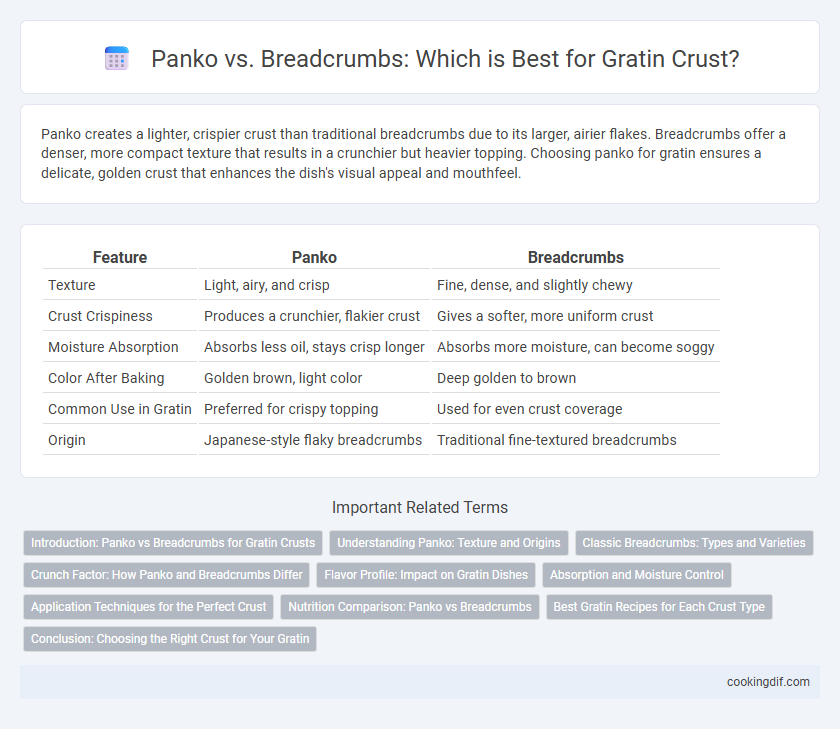Panko creates a lighter, crispier crust than traditional breadcrumbs due to its larger, airier flakes. Breadcrumbs offer a denser, more compact texture that results in a crunchier but heavier topping. Choosing panko for gratin ensures a delicate, golden crust that enhances the dish's visual appeal and mouthfeel.
Table of Comparison
| Feature | Panko | Breadcrumbs |
|---|---|---|
| Texture | Light, airy, and crisp | Fine, dense, and slightly chewy |
| Crust Crispiness | Produces a crunchier, flakier crust | Gives a softer, more uniform crust |
| Moisture Absorption | Absorbs less oil, stays crisp longer | Absorbs more moisture, can become soggy |
| Color After Baking | Golden brown, light color | Deep golden to brown |
| Common Use in Gratin | Preferred for crispy topping | Used for even crust coverage |
| Origin | Japanese-style flaky breadcrumbs | Traditional fine-textured breadcrumbs |
Introduction: Panko vs Breadcrumbs for Gratin Crusts
Panko offers a lighter, crispier texture that enhances gratin crusts with a delicate crunch compared to traditional breadcrumbs. Made from crustless white bread, panko absorbs less oil, resulting in a less greasy, more airy topping. Breadcrumbs, often finer and denser, create a compact crust providing a more uniform golden finish but lacking panko's distinctive crispness.
Understanding Panko: Texture and Origins
Panko, a Japanese-style breadcrumb made from crustless white bread, offers a uniquely light and airy texture that crisps up more effectively than traditional breadcrumbs in gratin dishes. Its coarse, flaky structure creates a superior crunchy crust, enhancing the overall mouthfeel and visual appeal of a gratin. Originating from Japanese cuisine, panko's distinctive production process involves baking bread using an electrical current to produce a crispier and less dense crumb ideal for layering atop gratins.
Classic Breadcrumbs: Types and Varieties
Classic breadcrumbs come in several varieties, including fresh, dry, and seasoned, each imparting distinct textures and flavors to gratin crusts. Fresh breadcrumbs offer a softer, moister crust, while dry breadcrumbs create a crispier, golden topping due to their low moisture content. Seasoned breadcrumbs contain herbs and spices that enhance the gratin's flavor profile, providing a savory depth beyond basic texture.
Crunch Factor: How Panko and Breadcrumbs Differ
Panko provides a lighter, airier texture that delivers an exceptionally crisp and crunchy crust ideal for gratin dishes, enhancing every bite with a satisfying snap. Traditional breadcrumbs are finer and denser, resulting in a more compact and slightly softer crust, which absorbs more moisture during baking. Choosing panko over regular breadcrumbs significantly elevates the crunch factor, ensuring a gratin topping that remains crisp and golden brown throughout cooking.
Flavor Profile: Impact on Gratin Dishes
Panko breadcrumbs create a lighter, crispier crust with a subtle, airy texture that enhances the golden-brown finish of gratin dishes without overpowering the flavors. Traditional breadcrumbs offer a denser, more compact crust with a richer, slightly toasted taste that adds depth and a hearty bite to the gratin. Choosing between panko and traditional breadcrumbs influences the overall texture and flavor balance, where panko provides a delicate crispness and breadcrumbs deliver a robust, savory crust.
Absorption and Moisture Control
Panko breadcrumbs create a lighter, crunchier crust due to their larger flakes and lower absorption rate, which helps maintain moisture without becoming soggy. Traditional breadcrumbs absorb more liquid, leading to a denser, often heavier crust that can trap excess moisture. For gratin dishes, using panko optimizes crispiness while controlling moisture, ensuring a perfectly balanced texture.
Application Techniques for the Perfect Crust
Panko offers a lighter, crunchier texture for gratin crusts due to its coarser, flakier crumbs that enable better air circulation and even browning, while traditional breadcrumbs create a denser, chewier finish. For optimal application, evenly sprinkle panko over a butter-coated surface to ensure crispiness without sogginess, or combine breadcrumbs with grated Parmesan for enhanced flavor and a slightly firmer crust. Lightly press the topping to adhere and bake uncovered to achieve the perfect golden-brown, crispy gratin crust.
Nutrition Comparison: Panko vs Breadcrumbs
Panko breadcrumbs contain fewer calories and less fat compared to traditional breadcrumbs, making them a lighter option for gratin crusts. They are made from crustless white bread, resulting in a coarser texture and lower oil absorption during cooking. Regular breadcrumbs may have higher sodium and preservatives depending on the brand, impacting overall nutrition.
Best Gratin Recipes for Each Crust Type
Panko delivers a light, airy, and extra-crispy crust ideal for gratins requiring a crunchy topping, enhancing textures in recipes like potato or vegetable gratins. Traditional breadcrumbs offer a finer, denser crust that absorbs flavors and creates a moist, cohesive layer, perfect for creamy gratins with cheese or bechamel sauces. Choose panko for a crisp, golden finish in gratins that benefit from contrast, and breadcrumbs for a richer, more uniform crust in classic baked dishes.
Conclusion: Choosing the Right Crust for Your Gratin
Panko offers a lighter, crunchier texture that creates an airy, crisp crust ideal for gratins with a delicate interior, while traditional breadcrumbs provide a denser, more cohesive topping that holds moisture well and adds a rich, buttery flavor. For gratins requiring a robust, golden-brown crust, panko is the preferred choice due to its superior crispness and ability to brown evenly. When a softer, more uniform crust is desired, especially in recipes with heavier sauces, classic breadcrumbs deliver a consistent texture and enhanced flavor integration.
Panko vs Breadcrumbs for crust Infographic

 cookingdif.com
cookingdif.com